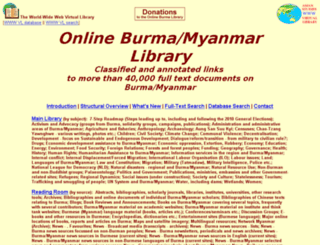Focal point
Location
The Online Burma/Myanmar Library (OBL) is a non-profit online research library mainly in English and Burmese serving academics, activists, diplomats, NGOs, CSOs, CBOs and other Burmese and international actors. It is also, of course, open to the general public. Though we provide lists of Burma/Myanmar news sources, the Library’s main content is not news but in-depth articles, reports, laws, videos and links to other websites, We provide a search engine (database and full text) and an alphabetical list of categories and sub-categories, but the Library is best accessed through browsing the 100 or so categories which lead to sub- and sub-sub categories. These tools should be used in combination.
Members:
Resources
Displaying 1061 - 1065 of 1151IDP material by the Border Consortium (TBC)
For IDP material (from 2002), scroll down to IDPs and choose a year....very useful and well-researched and written reports.
Ashley South: Publications on Burma
List of published books and links to more than 20 online documents, mostly on the Mon, the Karen and internal displacement in Burma/Myanmar ....."Ashley South is an independent writer and consultant, specialising in humanitarian and political issues in Burma/Myanmar and Southeast Asia.
International Land Coalition
Our Mission:
A global alliance of civil society and intergovernmental organisations working together to promote secure and equitable access to and control over land for poor women and men through advocacy, dialogue, knowledge sharing and capacity building...
Our Vision:
Secure and equitable access to and control over land reduces poverty and contributes to identity, dignity and inclusion.
Mongabay.com - Myanmar (Burma)
Rich, colourful rather chaotic site..."...Until the late 1990s, large parts of southern and eastern Burma had remained free from military rule due to the resistance of indigenous groups. However the inflow of foreign capital, mainly through offshore natural gas concessions to foregin firms, has given the military the means to assert control over these regions and increasingly exploit teak and other forest resources, in addition to local populations.


